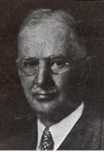Morris E. Leeds
Born: 6 March 1869
Died: 8 February 1952
Early Life and Education
Morris Evans Leeds was born in Philadelphia, 6 March 1869, to Barclay Robert and Mary (Maule) Leeds. He received his preparatory education at the Westtown (PA) Boarding School of the Society of Friends, and was graduated B.S. at Haverford College in 1888. During 1892-93 he was a graduate student in physics at the University of Berlin.
Inventor and Manager
In 1899 Leeds organized and became managing partner in the firm of Morris E. Leed's & Co., manufacturers of electrical instruments. Four years later he joined Edwin F. Northrup in forming the Philadelphia firm of Leeds & Northrup Co., manufacturers of electrical instruments and pyrometers. He was president of the new company from its inception until 1939, and continued in the role of Chairman of the board of directors until his death in 1952.
Leeds served as a prolific innovator as well as manager focused on technical development. He invented a number of the electrical and temperature measuring instruments the company manufactured, including a recorder in 1910 (U.S. Pat. No. 965,824), speed control apparatus in 1913 (No. 1, 057,416), measuring apparatus in 1914 (No. 1,097,651), electrical recorder in 1915 (No. 1,125,699), composite resistance in 1916 (No. 1,192,911), and an automatic control in 1917 (No. 1,332,182). Under his direction the products of Leeds & Northrup expanded to include such instruments as galvanometers, standard resistances, and Wheatstone bridges, condensers, and potentiometers; temperature recording and copies; trolling apparatus, including resistance thermometers, optical pyrometers and thermocouples with potentiometer reading, recording and controlling devices; and electrochemical apparatus such as that for determining the conduct electrolytes and hydrogen ion concentration, the latter being used in a wide range of industrial plants and in laboratories of public service corporations, government departments, colleges, and schools.
Leeds was interested in issues of industrial organization and labor, establishing at his company a system whereby voting stock in the business was owned by executives and workers. During the Depression, he was active in the federal government efforts to address these same issues. He served as a member of the industrial advisory board of the National Recovery Administration, the Emergency Employment Committee under Herbert Hoover, the advisory council to the President's Committee on Economic Security under Franklin D. Roosevelt, the advisory committee on industrial relations of the National Industrial Conference Board, and the business advisory council of the U.S. Department of Commerce (1933-39). He was co-author of Towards Full Employment, published in 1934, and lectured on practical business for two years at the University of Buffalo.
Professional Organizations and Honors
Leeds was an organizer of the Association of Scientific Apparatus of the United States of America and served as its president during 1920-26. He was a fellow of the American Association for the Advancement of Science and the American Institute of Electrical Engineers. He also served as a member of the Academy of Natural Sciences, American Academy of Political and Social Science, American Physical Society, and the American Philosophical Society.
He also received a number of awards in recognition of his work, including honorary degrees from Brooklyn Polytechnic Institute in 1936 (D.Sc.) and Haverford College in 1946 (LL.D.) Numerous other awards recognized his achievements as both an inventor and manager, including the Edward Longstreth Medal of the Franklin Institute in 1920 for his invention of the Leeds & Northrup recorder, the Gantt Medal of the Institute of Management in 1936, the American Society of Mechanical Engineers Medal in 1946. In 1948, he was awarded the Edison Medal of the American Institute of Electrical Engineers "For his contributions to industry through development and production of electrical precision measuring devices and controls." In 1958, The Morris E. Leeds Award was established by a predecessor organization of the IEEE for outstanding contributions in the field of electrical measurement.
